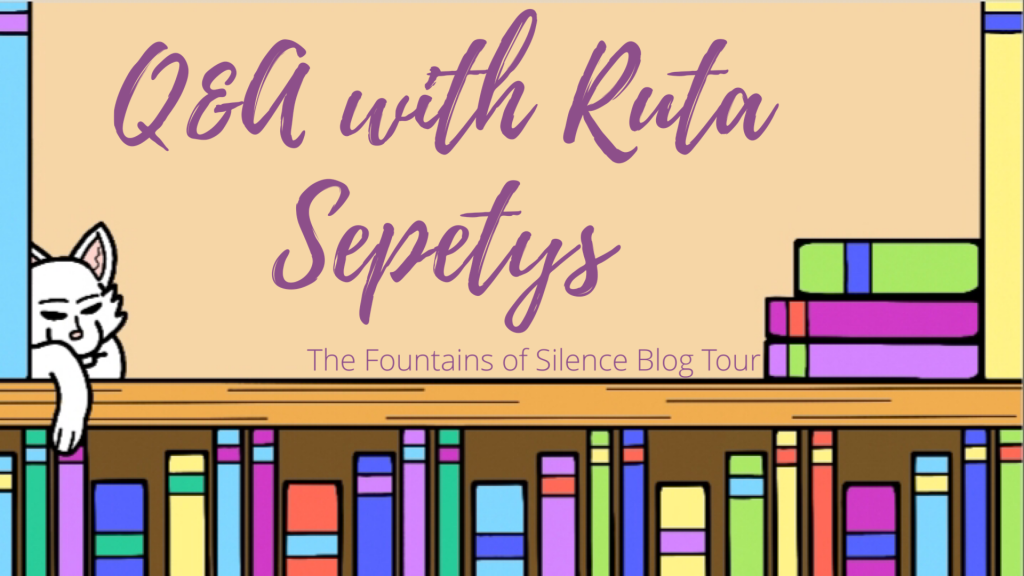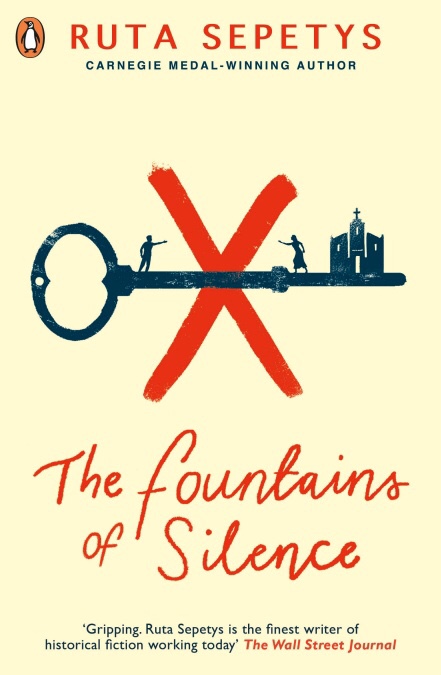
Hi everyone! Welcome back to my blog! I have a really exciting blog post for you – an interview with Ruta Sepetys! Today is my stop on the blog tour for Sepetys’ most recent work, The Fountains of Silence. I am so excited to celebrate this wonderful book.

The Fountains of Silence takes us to Franco’s fascist Spain in 1957. Despite being a country that I have traveled to many times, I am sad to admit that I didn’t know as much as I would have liked about Spain’s history prior to reading this book. Below is the Goodreads synopsis if you would like to know more.
Goodreads Synopsis:
Madrid, 1957. Under the fascist dictatorship of General Francisco Franco, Spain is hiding a dark secret. Meanwhile, tourists and foreign businessmen flood into Spain under the welcoming promise of sunshine and wine. Among them is eighteen-year-old Daniel Matheson, the son of an oil tycoon, who arrives in Madrid with his parents hoping to connect with the country of his mother’s birth through the lens of his camera. Photography–and fate–introduce him to Ana, whose family’s interweaving obstacles reveal the lingering grasp of the Spanish Civil War–as well as chilling definitions of fortune and fear. Daniel’s photographs leave him with uncomfortable questions amidst shadows of danger. He is backed into a corner of difficult decisions to protect those he loves. Lives and hearts collide, revealing an incredibly dark side to the sunny Spanish city.

Interview With Ruta Sepetys
Now let us get onto why you’re all here. The interview and discussion with this talented author.
In the general discussion at the beginning of the event, Sepetys shared some really interesting facts about the inspiration for The Fountains of Silence that I would like to share. Picture Ruta Sepetys on tour in Spain for one of her previous books when she is approached by a group of Spanish students at the end of an event. They loved her method of sharing history and explained that Franco’s era of Spanish history is one that still goes largely unspoken. They wanted to know more about it and requested that Sepetys write a book on the subject. Initially Sepetys’ instinct was that she couldn’t possibly, having no Spanish roots of her own. However, she couldn’t stop thinking about the Spanish students and this era of history until eventually she found a way of telling it. She created her protagonist, Daniel, to be a tourist to Spain. Since her protagonist was to be an outsider like herself, The Fountains of Silence was born and Sepetys found herself in a position to share this story.
Listening to Ruta Sepetys speak was just a joy. Her passion for history and writing alike shone through with every detailed answer she gave to each question. Her enthusiasm was second to none. It is this enthusiasm that make her books so captivating for young adults and adults alike. From a young age, she developed my interest in the past, which definitely put me on the road to where I am today, studying a degree in History and Politics. It was a huge honour and privilege of mine to be able to attend an intimate blogger event with her. She is an author who I greatly admire for her ability to shed light on often untold histories and getting to ask her a few questions of my own was just incredible.
You can tell a lot from an author about who they would invite to their literary dinner party and so I thought that there was no better question to begin with than this one.
“I think I would invite people who I knew could and would carry the conversation.”
– Ruta Sepetys
Similar to many writers, and certainly relevant to myself, Sepetys described herself as very much an introvert who was attracted to writing as a form of story telling for its solitary nature. For that reason, she emphasised that she would want prominent figures who would be willing to hold up the conversation in attendance. She mentioned names like Daphne du Maurier to tell The Apple Tree story, and Truman Capote to “light up the room and be really controversial,” to provoke conversation. She also added Roald Dahl to the mix, and went on to discuss how more strong women needed to be there too. For this, she determined that Emily Brontë would be perfect for the job. Sepetys shared that she would utilise this time with Brontë by asking her “for a masterclass on setting”. Interestingly, Sepetys also has a deep love for a lot of Russian female writers due to the unique experiences they share in their works. Ludmilla Petrushevskaya was a name she highlighted and one she described as “an incredible, incredible writer”. Finally she invited a writer from Belarus, Svetlana Alexievich, who wrote The Unwomanly Face of War to her dinner party. She wrote about the female experience during war, which sounds right up Sepetys’ street, as that is an underrepresented area of history.
For my second question, I created an imaginative scenario. I asked Sepetys if she could travel to any historical period, what would it be and why? The only catch was that she could only visit one place and only for one day. Her answer could not have been more emotive, important, and heart-warming. If you are not familiar with Ruta Sepetys, she is Lithuanian-American. Her father fled from Lithuania during the second world war and the answer Sepetys gave to my question was very much in honour of her father and her heritage.
“I would visit June of 1940 in Kaunas, Lithuania when my father was forced to flee and told he was on the execution list.”
– Ruta Sepetys
Sepetys determined to visit Kaunas, Lithuania, which is her father’s hometown. She said that she would choose the day her father discovered that he was on the execution list and had to flee the place he had always known. Although that was an extremely difficult period in time, Sepetys wanted to visit to assist her father today. She explained that whilst her father vividly remembers the years that came after, including his time spent in refugee camps, the moment that sparked everything has since faded in his memory. She described how her father remembers very little of the day and how he has so many questions that might never be answered. Ruta Sepetys talked about how she “would love to be able to fill in the blanks of his story for him”.
I was so honoured that Sepetys chose to be so open in sharing this history with us and I think that is what makes her such a valuable writer to our time. She doesn’t just re-write historical events, she forms deep connections to the periods and shows us history as readers have never understood it before. In Between Shades of Grey it is her family connection that ties her to the story. In The Fountains of Silence her connection comes through her protagonist, Daniel, and the Spanish students who decided that she would be the perfect person to share their past with the world. In the talk, she also shared that part of her research process is physically travelling to the place her story takes place. In other words, Sepetys is as dedicated to research as she is to the creative craft of writing.

Ruta Sepetys and her works have been rightfully praised and awarded (The Fountains of Silence has even been recently shortlisted for the Carnegie award!). She has spoken in the European Parliament, NATO, the U.S. Capitol, and more. She is an inspiring figure and I am so happy to have been able to spend some time in her presence (even virtually!). I hope you have enjoyed reading this post as much as I enjoyed sharing it. Thanks so much to Ruta Sepetys, and to Nina Douglas who sent me a copy of The Fountains of Silence and invited me to this wonderful event.

